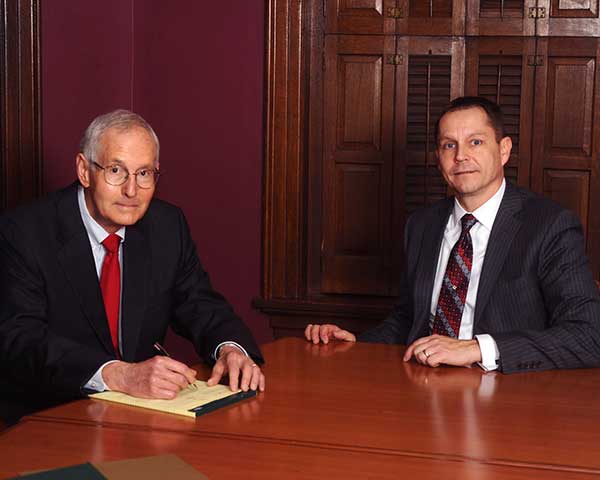Stroudsburg Real Estate Lawyers
Zoning, land use and subdivision regulations regulate the use and development of the real property. Significant property rights can be affected by these regulations. It is important for owners and developers of real properties to have experienced counsel during the process of property acquisition, financing and development. Before acquiring any property, it is important to know how that property may be lawfully used and developed. If an owner or developer is contemplating a land development, the process of obtaining regulatory approvals for the use of a property as desired by the owner or developer can be challenging.
We have been selected by nationally known companies, regional developers, and local developers and landowners in many land development, subdivision and land use matters including variances, special exceptions, conditional use approvals, subdivision approvals, and land development approvals. We strive to achieve positive outcomes in a timely and cost-effective manner whether the issue is a variance for home addition or a conditional use and land development approval for a shopping center, hotel, or industrial plant.
Our experienced real estate attorneys will be pleased to provide their knowledge and experience in guiding an owner and developer through the challenging land development and land use approval process. Contact us online or call 570-559-5507.
1. What proof must be submitted to obtain a variance?
Where a dimensional variance is involved, in general, the applicant must demonstrate that: (i) the need for the variance arises out of certain physical conditions of the property, for example, where there are substantial steep slopes or wetland areas of the property that cannot be developed; (2) the need for the variance cannot arise from conditions created by the applicant; and (3) the variance requested is the minimum necessary for the reasonable use of the property. Where only a very minor dimensional variance is required for the burden of proof on the applicant to obtain a variance may be less stringent.
2. Do I need a lawyer to obtain a variance?
Any landowner has the right to apply for a variance and to appear before a Zoning Hearing Board without the benefit of legal counsel. Since there are specific elements of proof that must be introduced into the record before a Zoning Hearing Board and in view of the fact objectors may contest a variance application it is advisable to consider engaging the services of a lawyer in this process.
3. What is a conditional use?
Generally, a conditional use is a use designated by an ordinance as a permitted use in a particular zoning district but subject to certain additional conditions that must be established by the applicant. A conditional use involves a hearing before the governing body of the municipality. Typically, the Zoning Ordinance specifies the additional conditions the applicant must address in a conditional use hearing which may include, for instance, the fiscal impact of a project, the traffic impact of a project or specific development standards set forth in the ordinance in question.
4. What is a special exception?
A special exception is a use permitted in a particular zoning district but which requires the applicant to address certain additional conditions of approval. A special exception requires a public hearing before the municipality’s Zoning Hearing Board.
5. Do I need a lawyer to obtain a conditional use approval or special exception approval?
A developer or landowner is not required to engage the services of a lawyer for a conditional use hearing or special exception hearing. However, since there are specific elements the developer or landowner must prove in the hearing and in view of the fact any person having a legal interest in the matter can attend and participate in the hearing as an objector, it is advisable to engage the services of a lawyer for guidance and representation in the conditional use or special exception hearing process.
6. Is it possible to change, enlarge or otherwise modify a nonconforming use or nonconforming structure?
The provisions of the zoning ordinance for the municipality in question must be carefully reviewed to determined what restrictions, if any, apply to change, enlarge or modify an existing nonconforming use or structure.
7. Can a landowner lose rights to maintain, enlarge or expand a nonconforming use or structure?
The provisions of the zoning ordinance applicable to the property in question must be carefully examined to determine what restrictions, if any, have been adopted by the municipality in question. For instance, certain municipalities have adopted ordinance provisions, which provide that if a nonconforming structure is damaged or destroyed and not repaired or restored within a time period specified in the ordinance in question the owner may lose the right to restore or rebuild the damaged or destroyed nonconforming structure.
8. If I own a nonconforming lot can I build on that lot?
The provisions of the zoning ordinance of the municipality in question must be carefully reviewed. Some zoning ordinances contain provisions restricting the right of an owner of a nonconforming lot to build on the nonconforming lot where such owner owns a contiguous property.
9. What is the difference between a waiver or modification and a variance?
Subdivision and land development ordinances typically contain provisions granting the governing body the right to grant waivers or modifications of the provisions of the subdivision and land development ordinance. The governing body does not have the right to grant variances from provisions of the zoning ordinance. Only a Zoning Hearing Board can grant variances from the provisions of a zoning ordinance. Just as with variances, where a landowner seeks a waiver or modification of a subdivision and land development ordinance provision typically the subdivision and land development ordinance contain standards and specify the burden of proof the applicant must meet in order for the governing body to grant such relief.

